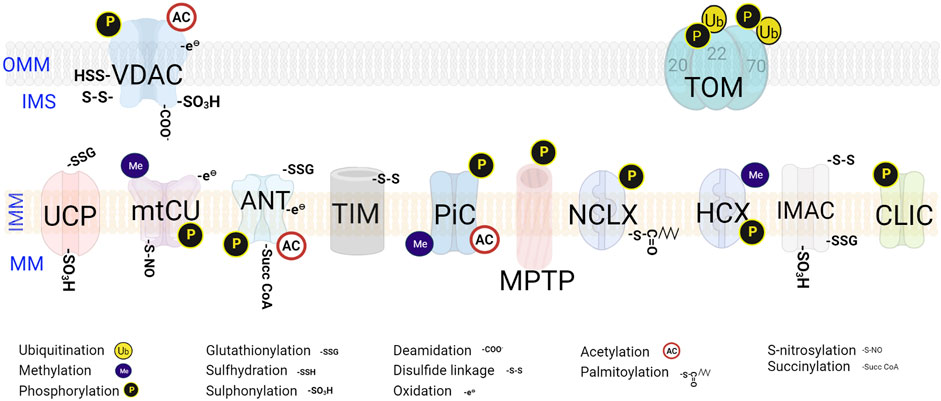Mitochondrial Protein Posttranslational Modification Analysis Service
- Cell Signaling Studies: Uncover phosphorylation- and acetylation-based regulatory networks involving mitochondrial protein PTMs.
- Energy Metabolism Mechanism Exploration: Investigate how specific modifications affect metabolic pathways such as oxidative phosphorylation and fatty acid oxidation.
- Disease Mechanism Research: Analyze abnormal mitochondrial PTMs in disease states to help elucidate underlying molecular mechanisms.
- Target Discovery and Drug Development: Identify disease-associated modification sites as potential therapeutic targets for intervention.
Mitochondrial Protein Posttranslational Modification Analysis Service is a specialized technical service focused on profiling posttranslational modifications (PTMs) of mitochondrial proteins. This service systematically reveals the dynamic changes of mitochondrial PTMs and helps elucidate their functional roles in both physiological and pathological processes. It provides critical insights for disease mechanism research, drug target identification, and biomarker development.
Posttranslational Modifications (PTMs) refer to the chemical modifications that occur on proteins after translation, either through enzymatic or non-enzymatic processes. Common PTMs include phosphorylation, acetylation, succinylation, ubiquitination, O-GlcNAcylation, nitration, and oxidative modifications. These modifications regulate various aspects of protein function, such as localization, activity, stability, and interactions with other molecules.
As the cellular “powerhouse”, mitochondria play a central role in maintaining metabolic homeostasis, signal transduction, oxidative stress responses, and programmed cell death. Recent studies have revealed that the fine-tuning of mitochondrial function heavily depends on PTMs within the mitochondrial proteome.

Kadam A. et al. Front Cell Dev Biol. 2023.
Figure 1. Post-translational modifications on mitochondrial channels and transporters.
Leveraging advanced mass spectrometry platforms and efficient mitochondrial isolation and PTM enrichment strategies, MtoZ Biolabs offers Mitochondrial Protein Posttranslational Modification Analysis Service to precisely identify modification types and specific sites and provide quantitative and functional annotation support, facilitating a deeper understanding of mitochondrial regulatory mechanisms and the molecular basis of disease pathogenesis.
Analysis Workflow
The general workflow of Mitochondrial Protein Posttranslational Modification Analysis Service is as follows:
1. Mitochondrial Isolation and Purification
High-purity mitochondria are extracted from tissues or cells using differential centrifugation or commercial isolation kits.
2. Protein Extraction and Digestion
Mitochondria are lysed to extract proteins, followed by enzymatic digestion (e.g., trypsin).
3. Modified Peptide Enrichment
Based on the type of modification, peptides are enriched using strategies such as TiO₂ chromatography, antibody affinity purification, or chemical labeling.
4. LC-MS/MS Detection
Peptides are analyzed using nano-liquid chromatography coupled with tandem mass spectrometry (LC-MS/MS).
5. Data Analysis and Functional Annotation
Modification sites are identified and quantified, followed by functional annotation and pathway analysis using tools such as GO and KEGG.
Service Advantages
1. Advanced Analysis Platform: MtoZ Biolabs established an advanced Mitochondrial Protein Posttranslational Modification Analysis Service platform, guaranteeing reliable, fast, and highly accurate analysis service.
2. One-Time-Charge: Our pricing is transparent, no hidden fees or additional costs.
3. High-Data-Quality: Deep data coverage with strict data quality control. AI-powered bioinformatics platform integrates all Mitochondrial Protein Posttranslational Modification Analysis data, providing clients with a comprehensive data report.
4. Broad PTM Coverage: Includes both common and emerging posttranslational modifications such as phosphorylation, O-GlcNAcylation, acetylation, and more.
5. High Mitochondrial Specificity: Employs rigorous subcellular fractionation procedures to ensure result accuracy and mitochondrial specificity.
Sample Submission Suggestions
Sample Types: Compatible with cells, tissues, or pre-extracted mitochondrial proteins.
Storage and Shipping: Samples should be snap-frozen in liquid nitrogen and stored at −80°C. Avoid repeated freeze-thaw cycles. Ship on dry ice.
Preprocessing Requirements: Avoid using interfering components such as EDTA, Tris, or glycerol. Use MS-grade lysis buffer where possible.
Additional Notes: For detailed and project-specific sample preparation advice, please contact our technical support team prior to submission.
Applications
Application examples of Mitochondrial Protein Posttranslational Modification Analysis Service:
Deliverables
1. Comprehensive Experimental Details
2. Materials, Instruments, and Methods
3. Total Ion Chromatogram & Quality Control Assessment (project-dependent)
4. Data Analysis, Preprocessing, and Estimation (project-dependent)
5. Bioinformatics Analysis
6. Raw Data Files
Related Services
Mitochondrial Protein Phosphorylation Analysis Service
How to order?







